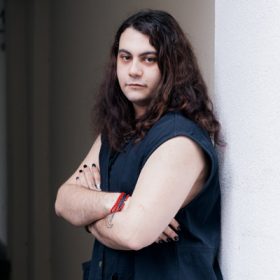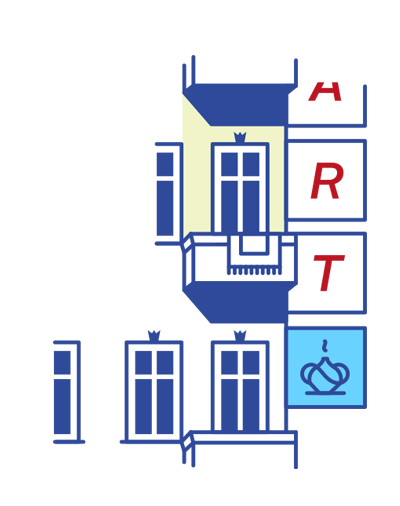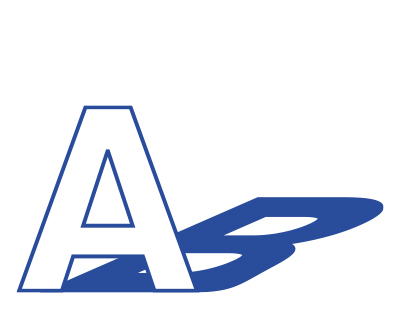Sam Zamrik’s Sonnenallee: Wie funktioniert Lyrik im Jahr 2024?

Sam Zamrik nimmt uns in eigens verfassten Gedichten mit in Gedankenwelten zu Identitätsfragen und Exilerfahrungen. Für AufRuhr hat Zamrik eine Auswahl an Gedichten zusammengestellt.
Wer denkt, dass Gedichte und Poesie veraltet sind, irrt sich gewaltig. Der 1996 im Damaskus/Syrien geborene Sam Zamrik zeigt, wie Lyrik heute funktioniert und Leser*innen zum Nachdenken bringt. Die Gedichte des in Berlin lebenden Autors beleuchten – teils autofiktional – transkulturelle Aspekte unserer Gesellschaft. Der Schwerpunkt der Arbeit des Mercator Fellows ist die Verschiedenartigkeit von Exilerfahrungen. Darüber hinaus erforscht Zamrik, wie die gegenwärtige Weltlage tiefgreifende Auswirkungen auf das private und öffentliche Leben von Menschen hat, den sozialen Fortschritt hemmt und Möglichkeiten zur Überwindung dieser Herausforderungen aufzeigt. Drei Gedichte führen uns besonders eindrucksvoll in diese Themenwelten ein …

Sam Zamrik ist Lyriker, Übersetzer und politischer Bildner. 2022 erschien im Hanser Berlin Verlag Zamriks zweisprachiges Buch „ICH BIN NICHT“. Es wurde mit dem Wunderblock Award ausgezeichnet und hat den Autor im deutsch- und englischsprachigen Raum bekannt gemacht. Zamrik schreibt außerdem für die literarische Plattform „Weiter schreiben“ von wearedoingit e.V.. Von Juni 2023 bis Mai 2024 ist Sam Zamrik Mercator Fellow.

Cyborg
Two worlds tear at me,
each with their own
places and faces and milestones.
To my left, little greenlings grow,
and though they live in different
little pots and little huts,
they sway all the same
with the winds that forewarn
of the coming war, creeping—
To my right, an earful of content
and an eyeful of binary air
that spares neither digit nor point
from its cunning cloud.
It counts and foretells aloud;
it kneads light into forecasts
and commands an army
of gratis corpses.
I use both to stand;
to extend my hand,
to earn my bread
and to feed my head.
How long will either last?

Alley of the Sun
Alley of the Sun, the little Syria I found where I least expected a piece of home. The specters of Damascus, Jerusalem, and Baghdad haunt its dirty walls. These specters! These specters are the remnants of home we carry wherever we go. They flaunt their ancient wealth; they dress Berlin in embroidered silk, blue agate, and inlaid walnut. They adorn it with gold and silver from wrist to elbow, so that it may shimmer against metropolitan soot and Protestant drabs. They speak through the walls of Berlin, these specters, whispering and hissing timeless scripture, their miswaks squeaking against their yellowed teeth; their ululations echo behind the sun when they are joyed. Like brides at the cusp of climax, they fill the air with frankincense and musk, with the breaths of a hundred kitchens, with the clouds of a thousand coughs, heavy-laden with sweetened smoke and cold sweat. The specters of these cities have affixed themselves to the Alley, to its street signs and its shop windows. They reproduce themselves in perpetuity; they inhabit bodies and spaces and fill the air with multiplicity. Their faces are lit by flickering blue lights looking to fill a quota, and their ears are filled with sirens and demands. Their wrists are wrung with metal, and their heads are tied to paper. Their backs are weighed down with the heft of centuries, yet you can hear them laugh in the wind.
I go there seeking the remnants of my home and a scratch to my itch for Knafeh, and it gives; I go there eavesdropping to hear my dialect; I go there to remember why I left and why I am here, and it gives. This is what we postcolonial subjects call the reproduction of locality, this very experience of carrying our homes wherever we go and unpacking them piece by piece to hang up on the walls around us. We wear our memories for armor and warm ourselves with the distant echo of Fairuz, that we may remain ourselves in the elsewhere.

This is a poem, it starts with a comma splice and
Enjambs the
Verse at odd
Places and leaves
Your eyes stuck on the previous
Line, though this one is more important
Because the stanza ended on it
Now your mind is stuck
On the previous stanza
Though this one has already begun
Without warning
Or time to catch up
Here it happens
Again!
You have arrived at
The new
Stanza, but do you know
Yet whether they
Are connected?
I never understood
Why the first
Letter of each line is
Capitalized
And why
Punctuation altogether
Is grossly overlooked
As though writing vertically
Emancipates words
From the finality
Of periods
As though
The column of text
Is somehow floating
In abstract space
And not depressed into
Trees that were envious
Of our vocal ornaments
Before their death
Or into
Binaries
Whence worlds
Emerge.
Mercator Fellowship Programm
Das Mercator Fellowship-Programm bietet seinen Stipendiat*innen den Freiraum, sich explorativ und ideenreich einem Forschungs- oder Praxisvorhaben zu widmen.
